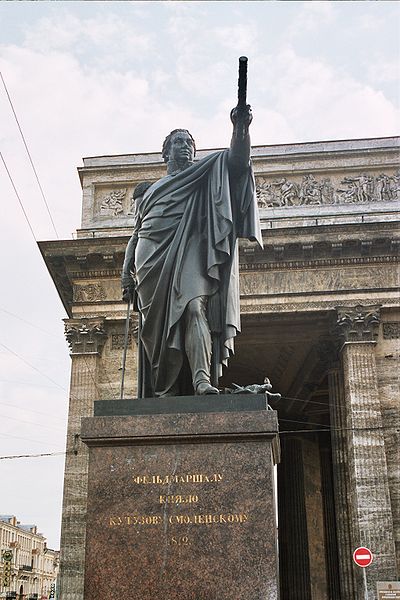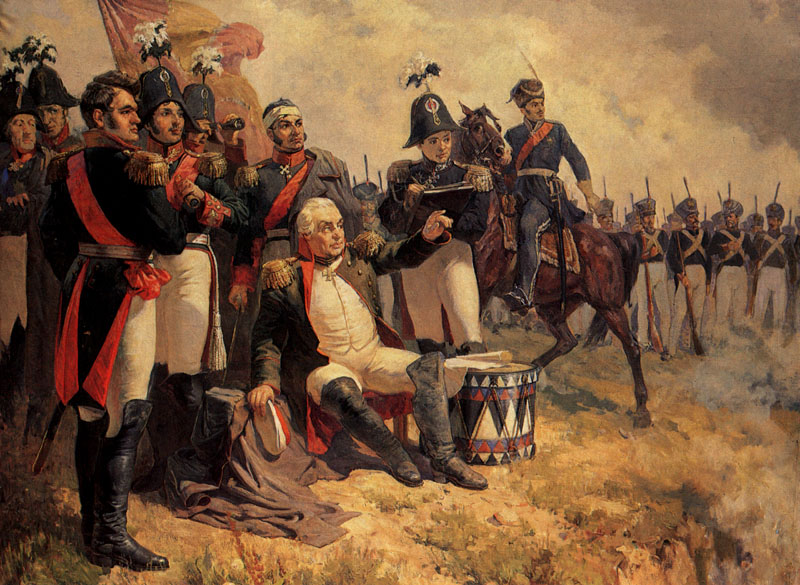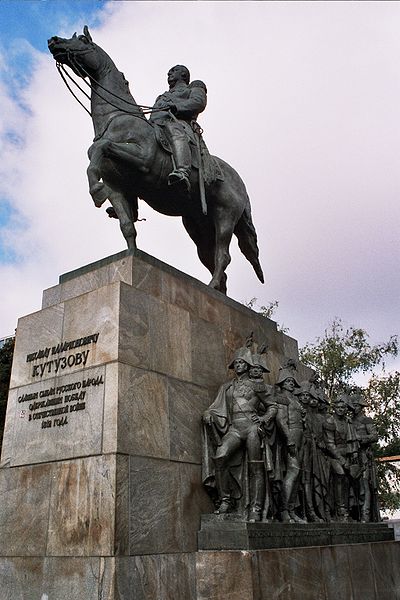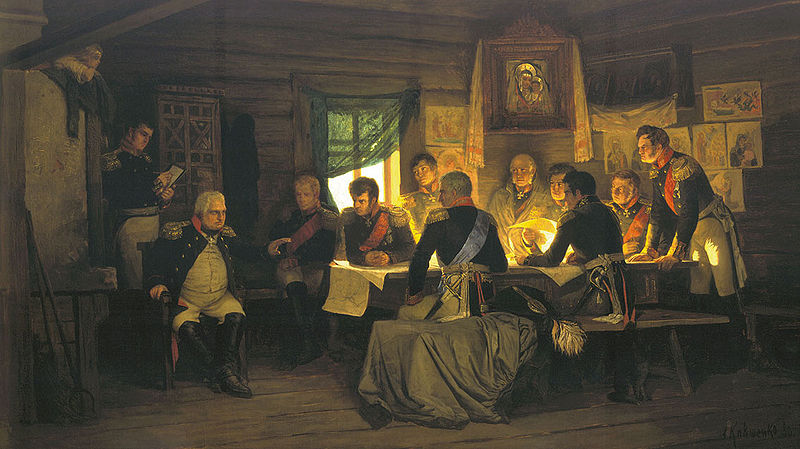<Back to Index>
- Physiologist Albert Szent-Györgyi de Nagyrápolt, 1893
- Bluesman B.B. King, 1925
- Field Marshal Mikhail Illarionovich Golenishchev Kutuzov, 1745
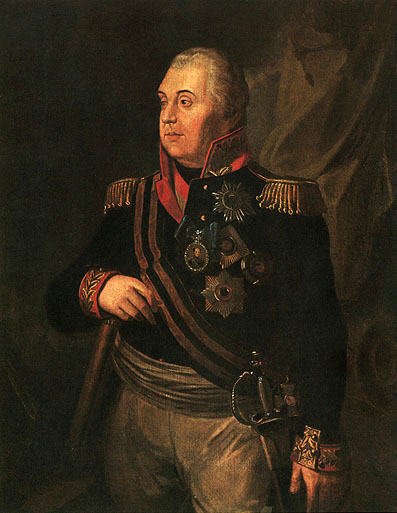
Prince Mikhail Illarionovich Golenishchev-Kutuzov (Russian: князь Михаи́л Илларио́нович Голени́щев-Куту́зов, usually shortened to Mikhail Kutuzov) (September 16 [O.S. September 5] 1745 — April 28 [O.S. April 16] 1813) was the Russian Field Marshal who defeated Napoleon's Grande Armée during France's invasion of Russia in 1812, the decisive turning point of the Napoleonic Wars.
Kutuzov was born in Saint Petersburg in 1745 and entered the Russian army in 1759 or 1760. He saw active service in Poland (1764–1769), and against the Turks (1770–1774); lost an eye in action in the latter year; and after that traveled for some years in central and western Europe.
In 1784 he became a major-general, in 1787 governor-general of the Crimea; and under Suvorov, whose disciple he became, he won considerable distinction in the Russo-Turkish War of 1787–1792, at the taking of Ochakov, Odessa, Bender and Ismail,
and the battles of Rimnik and Mashin. He was by that time (1791) a
lieutenant-general and successively occupied the positions of
ambassador at Constantinople, governor-general of Finland, commandant of the corps of cadets at Saint Petersburg, ambassador at Berlin, and governor-general of Saint Petersburg. Kutuzov was a favorite of Tsar Paul I, and after that emperor's murder he was temporarily out of favor with the new Tsar Alexander I, though he remained loyal. In 1805 Kutuzov commanded the Russian corps which opposed Napoleon's advance on Vienna. On the eve of Austerlitz Kutuzov
tried to prevent the Allied generals from fighting a battle. After
being overruled by the Tsar, as well as by the Austrian battle planner, Feldzeugmeister Weyrother,
he feigned sleep during the battle planning, determined not to be
blamed for a defeat. He was, however, present at the battle itself (2
December 1805), and was wounded. From 1806 to 1811 Kutuzov served as
governor-general of Lithuania and Kiev. He was then put in charge of the Russian army operating against the Turks in the Russo-Turkish War, 1806-1812.
Understanding that his armies would be badly needed in the upcoming
battle with the French, he hastily brought the prolonged war to a
victorious end and concluded the propitious Treaty of Bucharest, which stipulated for incorporation of Bessarabia into the Russian Empire. For this success he was conferred the rank of Knyaz (Prince or Duke). When Napoleon invaded Russia in 1812, Michael Andreas Barclay de Tolly (then Minister of War) chose to follow the scorched earth principle
and retreat rather than to risk a major battle. His strategy aroused
grudges from most of the generals and soldiers, notably Prince Pyotr Bagration.
Therefore, when Kutuzov was appointed commander-in-chief and arrived to
the army on August 17, he was greeted with delight. Kutuzov's personal
relationship with Bagration, however, was a very positive one. Within
two weeks Kutuzov decided to give major battle on approaches to Moscow. The two huge armies clashed near Borodino on
7 September 1812 in what has been described as the greatest battle in
human history up to that date, involving nearly a quarter of a million
soldiers. The result of the battle was inconclusive, with a third of
the French and half of the Russian army killed or wounded. After a
conference at the village of Fili, Kutuzov fell back on the strategy of his predecessor: withdraw in order to save the Russian army as long as possible. Kutuzov now held the rank of Field Marshal and had been awarded the victory title of His Serene Highness Knyaz Smolensky (Светлейший князь Смоленский) - having achieved this title for a victory over part of the French army at Smolensk in November 1812. Early in 1813 Kutuzov fell ill, and he died on 28 April 1813 at Bunzlau. Memorials have been erected to him there, at the Poklonnaya Hill in Moscow and in front of the Kazan Cathedral, Saint Petersburg, where he is buried, by Boris Orlovsky. As he had no male issue, his estates passed to the Tolstoy family
(one of his five daughters, Praskovia, had married Matvei Feodorovich
Tolstoy). Among Russian generals Kutuzov is held second only to his
teacher Suvorov. Alexander Pushkin addressed the Field Marshal in the famous elegy on Kutuzov's sepulchre, and he also figures as a patient and wise leader in Leo Tolstoy's War and Peace. During the Great Patriotic War (1941-45), the Soviet government established the Order of Kutuzov which, among several other decorations, was preserved in Russia upon the dissolution of the Soviet Union, thus remaining among the highest military awards in Russia. Also during the Second World War one of the key strategic operations of the Red Army, the Orel Strategic Offensive Operation "Kutuzov" was named after the Field Marshal (Russian: Орловская Стратегическая Наступательная Операция Кутузов) (12 July-18 August 1943).
This came at the price of losing Moscow, whose population was evacuated. Having retreated along the Kaluga road and replenished his munitions, he forced Napoleon into retreat in the Battle of Maloyaroslavets.
The old general's cautious pursuit evoked much criticism, but
ultimately only a small remnant (93,000 of the 690,000 men) of the Grand Army returned to Prussian soil alive. Hence the Russian general's caution was thoroughly vindicated.
